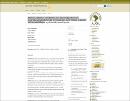Barriers, attitudes, confidence, and knowledge of nurses regarding metabolic health screening and intervention in people with mental illness: a pilot study from Uganda
Date
2019-11-06Author
Vancampfort, Davy
Watkins, Andrew
Ward, Philip B
Probst, Michel
De Hert, Marc
Van Damme, Tine
Mugisha, James
Metadata
Show full item recordAbstract
People with mental illness are at an increased risk for developing cardio-metabolic disorders. Routine screening following pharmacotherapy is however unacceptably low in sub-Saharan African countries with less than 1% adequately screened. It is unknown whether this is due to a lack of adequate competences.
Objectives: The aim of this pilot study was to assess the barriers, attitudes, confidence, and knowledge of nurses regarding metabolic health, prevention and treatment in Uganda.
Methods: Twenty-eight nurses (39% female, 30.9±6.9 years) completed the Metabolic – Barriers, Confidence, Attitudes and Knowledge Questionnaire and the physical activity prescription rate item of the Exercise in Mental Illness Questionnaire.
Results: More than 75% had a positive attitude towards metabolic screening and intervention and more than 50% were confident in providing smoking cessation advice, and physical activity and nutritional counseling. However, 57% stated that their heavy workload prevented them from doing health screening and promotion activities. There was a negative correlation (ρ=-0.54, P=0.003) between the frequency of physical activity prescription and the perception of the inability of patients to change.
Conclusion: The present findings suggest that nurses are generally supportive of metabolic health screening and intervention but their high workload prevents them from implementing metabolic health interventions.

